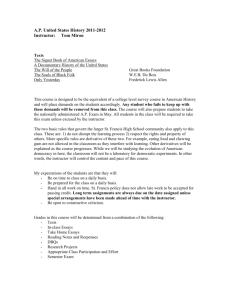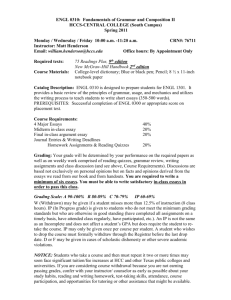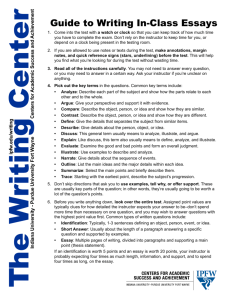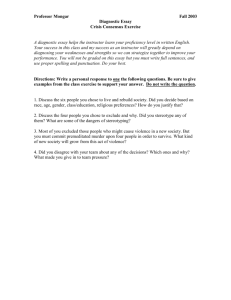Syllabus - return to main page
advertisement
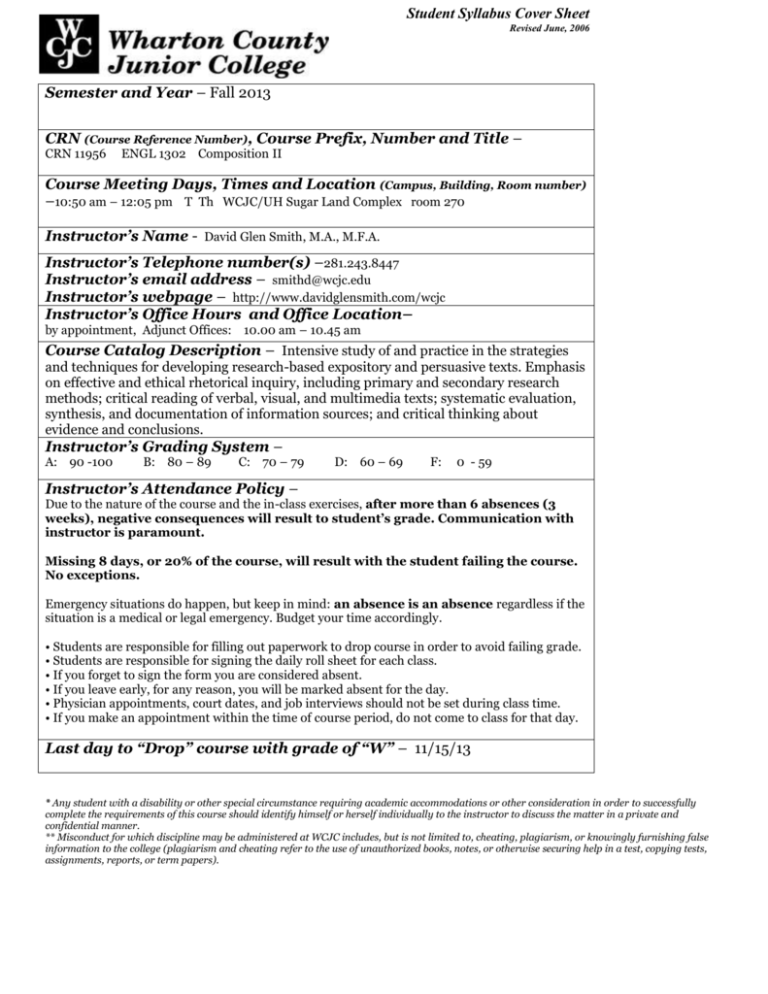
Student Syllabus Cover Sheet Revised June, 2006 Semester and Year – Fall 2013 CRN (Course Reference Number), Course Prefix, Number and Title – CRN 11956 ENGL 1302 Composition II Course Meeting Days, Times and Location (Campus, Building, Room number) –10:50 am – 12:05 pm T Th WCJC/UH Sugar Land Complex room 270 Instructor’s Name - David Glen Smith, M.A., M.F.A. Instructor’s Telephone number(s) –281.243.8447 Instructor’s email address – smithd@wcjc.edu Instructor’s webpage – http://www.davidglensmith.com/wcjc Instructor’s Office Hours and Office Location– by appointment, Adjunct Offices: 10.00 am – 10.45 am Course Catalog Description – Intensive study of and practice in the strategies and techniques for developing research-based expository and persuasive texts. Emphasis on effective and ethical rhetorical inquiry, including primary and secondary research methods; critical reading of verbal, visual, and multimedia texts; systematic evaluation, synthesis, and documentation of information sources; and critical thinking about evidence and conclusions. Instructor’s Grading System – A: 90 -100 B: 80 – 89 C: 70 – 79 D: 60 – 69 F: 0 - 59 Instructor’s Attendance Policy – Due to the nature of the course and the in-class exercises, after more than 6 absences (3 weeks), negative consequences will result to student’s grade. Communication with instructor is paramount. Missing 8 days, or 20% of the course, will result with the student failing the course. No exceptions. Emergency situations do happen, but keep in mind: an absence is an absence regardless if the situation is a medical or legal emergency. Budget your time accordingly. • Students are responsible for filling out paperwork to drop course in order to avoid failing grade. • Students are responsible for signing the daily roll sheet for each class. • If you forget to sign the form you are considered absent. • If you leave early, for any reason, you will be marked absent for the day. • Physician appointments, court dates, and job interviews should not be set during class time. • If you make an appointment within the time of course period, do not come to class for that day. Last day to “Drop” course with grade of “W” – 11/15/13 * Any student with a disability or other special circumstance requiring academic accommodations or other consideration in order to successfully complete the requirements of this course should identify himself or herself individually to the instructor to discuss the matter in a private and confidential manner. ** Misconduct for which discipline may be administered at WCJC includes, but is not limited to, cheating, plagiarism, or knowingly furnishing false information to the college (plagiarism and cheating refer to the use of unauthorized books, notes, or otherwise securing help in a test, copying tests, assignments, reports, or term papers). (Syllabus subject to change with advance notice.) RECOMMENDED BROWSER: We also have been told that Mozilla Firefox is better for Blackboard. Mozilla Firefox: www.mozilla.com TEXTBOOKS: Hacker, Diana. The Bedford Handbook. 8th ed. (red cover) Kirzner, Laurie G. and Stephen R. Mandell, eds. Compact Literature: Reading, Reacting, Writing. 8th ed. Recommended: College dictionary, flash drive ASSIGNMENTS AND GRADE PERCENTAGES: In Class Exercises/HW/POP Quizzes/Participation • Academic Summary Midterm (Critical Analysis & Terms) One critical analysis essay (two parts) (APA) Final Research Paper (four parts) (MLA) Final Exam 10% 15% 25% 25% 25% Students must keep copies of all returned work after grading in the unlikely event of data loss. Students will write a minimum of two full essays, portions of which will be begun in class if time permits. The two papers include— • 1 analytical comparison/contrast essay and • 1 research paper (final project) There will be in-class assignments, pop quizzes, and intensified reading homework. Completion of in-class assignments earns you points. Since these are based on specific lectures, you must be present on the day the in-class assignment is given and collected. No late work will be accepted for this category. STUDENT LEARNING OUTCOMES: 1. Demonstrate knowledge of individual and collaborative research processes. 2. Develop ideas and synthesize primary and secondary sources within focused academic arguments, including one or more research-based essays. 3. Analyze, interpret, and evaluate a variety of texts for the ethical and logical uses of evidence. 4. Write in a style that clearly communicates meaning, builds credibility, and inspires belief or action. 5. Apply the conventions of style manuals for specific academic disciplines (e.g., APA, CMS, MLA, etc.) ESSAY FORMAT: Essays should be typed and have a standard one-inch margin. All papers should be double-spaced. No title page is necessary. For all essays, on the first page, you should type your name, my name, English 1302, and the date in the left hand corner of the page. Return twice and center your title. Put your last name and the page number in the upper right hand corner of each page. See pages 115ff in Bedford for a sample essay format. Staple your paperwork before turning in assignments. I will not accept non-stapled homework. E-MAIL POLICY •Do not send e-mails requesting grades. Request a face-to-face appointment to discuss grades. Save all returned paperwork. Progressive grades will be shown to students throughout course. • Neither homework nor formal papers are accepted as an e-mail attachments. • All correspondence with instructor regarding school matters must be through the official student e-mail account provided by WCJC.edu. GRADING STANDARDS: Essays will be graded based on a variety of skills. First, content and organization are most important. All written work should show evidence of significant thought and contain logically presented ideas. Second, sentences, word use and tone, and punctuation and mechanics are important. You should pay close attention to eliminating major sentence errors, such as comma splices, fragments, and fused sentences. Points will be deducted for errors on your essays. LATE PAPER POLICY Since the progress of this class depends on essays turned in on time, late essays will be penalized ten points for each course day that they are late. If you miss class when an essay is due, your grade will show accordingly. After two course days (one week), late papers will not be accepted. REVISION POLICY: Only two assignments are structured for a revision process: the generation of an abstract for essay 1 and the declaration of the thesis for essay 2. Otherwise, no other assignment follows a revision policy. MISSED EXAMS POLICY Depending on circumstances, missed examinations will be given within a week of scheduled test during a scheduled appointment at the testing center. Students are required to make appointments for missed tests at their convenience. According to school policies, no pre-determined dates may be changed for the Final Exam. PLAGIARISM: If clear evidence of academic dishonesty is found for any assignment, 0 points for the assignment will be recorded, and the English Department Chair will be notified of the incident and the grade. If a second incident of academic dishonesty occurs, an F for the course grade will be recorded and the English Department Chair notified of the incident and the grade. CELL PHONE / TEXT MESSENGER/ LAPTOP POLICY Cell phones must be silent in class. If an important call arrives, take it into the hall quickly. On the other hand, no texting/IM/web surfing in the classroom. You will be asked to leave the room and will be given a mark of absence for the day. All desk surfaces should only show note-taking devices. Laptops are for note-taking only. If you hide your cell phone behind your school pack or your purse, you will be asked to leave and counted as absent. If you hide your cell phone in your lap or on your seat, you will be asked to leave and counted as absent. Regarding the final project: If clear evidence of academic dishonesty is found for the final project, an F for the course grade will be recorded; likewise the English Department Chair will be notified of the incident. SIX COURSE DROP LIMIT Under section 51.907 of the Texas Education Code, “an institution of higher education may not permit a student to drop more than six courses, including any course a transfer student has dropped at another institution of higher education.” A course that a student drops is counted toward the six-drop limit if: · The student was able to drop the course without receiving a grade or incurring an academic penalty; · The student’s transcript indicates or will indicate that the student was enrolled in the course · Once WCJC calculates that a student has a total of six affected drops from WCJC, he or she may not drop any additional courses at WCJC. The instructor will be required to award the grade of A, B, C, D, or F. · Exceptions: Severe illness, care of a sick or injured person, death of a family member, active duty service, change in work schedule that is beyond the control of the student, other good cause as determined by the institution. Keep in mind that it is the student’s responsibility to withdraw from the course. Faculty cannot withdraw students from the course. SERVICES FOR STUDENTS WITH DISABILITIES Wharton County Junior College is committed to providing a discrimination-free environment for its students with disabilities. Students with disabilities are encouraged to inform the college of any assistance they may need upon application. Early self-identification will allow the student to receive whatever accommodation he or she may need as quickly as possible. Students with disabilities are encouraged to register with the ADA Coordinator, located in the Office of Student Services and to provide appropriate documentation. This action entitles qualified students with disabilities to their legal rights and assures them of receiving information on services and procedures available to them. Disability information is strictly confidential and is not released without consent of the student. It is the responsibility of the student with a disability to voluntarily and confidentially disclose information regarding the nature and extent of the disability. Wharton County Junior College does not assume responsibility for providing special accommodations and services to students who have not identified themselves as having a qualifying disability and who have not made their need known. CLASSROOM DISCIPLINE: Include a statement about your classroom expectations. English 1302: Calendar of activities and due dates (subject to change with advance notice) Week Number 1 08/27 T: 08/29 Th: Activities and Lectures Basic introduction Academic Load Critical Analysis Process Guidelines for Reading Intertextuality Literary Devices 2 09/03 T: 09/05 Th: 3 09/10 T: 09/12 Th: 4 09/17 T: 09/19 Th: Conflict in Literature Library Orientation: Literary Databases Definitions of: Myth • Fable • Parable • Folk Tales Figurative Language Archetypes and Symbol Elements of Fairy Tales APA versus MLA Jacob & Wilhelm Grimm “The Goose Girl” Charles Perrault, “Little Red Riding Hood” p 528 • Exercise 1: Summarize Literary Work, due 09/24 Jacob & Wilhelm Grimm “Godfather Death” Creating a Literary Analysis- part 1 Creating a Critical Analysis Thesis • Assignment 1: Comparison/Contrast Analysis / APA Style, due 10/15- Week 8 5 09/24 T: 09/26 Th: 6 10/01 T: 10/03 Th: 7 10/08 T: 10/10 Th: 8 10/15 T: 10/17 Th: 9 10/22 T: 10/24 Th: Short Story Structure Setting Creating a Literary Analysis- part 2 Edgar Allan Poe, “The Cask of Amontillado” p 325 Charlotte Perkins Gilman, “The Yellow Wallpaper” p 376 William Faulkner, “A Rose for Emily” p 220 • Assignment 1: Comparison Paper Abstract due William Faulkner, “A Rose for Emily” p 220 James Joyce, “Eveline” p 597 Ernest Hemingway, “Hills Like White Elephants” p 129 Kate Chopin, “The Story of An Hour” p 205 • Assignment 1: Comparison Paper Full Paper due Review For MidTerm MidTerm Overview of Expectations for Final Project, MLA Style Thesis Declaration due: 11/14 Article Synopsis, due 11/07 Tentative Works Cited Page due 11/14 Final Project Due 11/21- Week 13 Basic Outline for Analytical Research: Step-by-Step Overview of Group Research Project, due 11/05 10 10/29 T: 10/31 Th: • Assignment 2: Group Research Project • Assignment 2: Group Research Project 11 11/05 T: 11/07 Th: • Assignment 2: Group Research Project due How to Read Poetry • Explication of Poetry Poetical Devices and Terminologies Eve Merriam "How to Eat a Poem" William Carlos Williams, "This is Just to Say" Anne Sexton, "Two Hands" • Article Synopsis due today 12 11/12 T: 11/14 Th: Haiku Modernist Poetry e. e. cummings, “l(a” e. e. cummings, “13” William Carlos Williams, “Red Wheelbarrow”p 744 Overview of T.S. Eliot, “The Love Song of J. Alfred Prufrock” p 602 11/15 F: 13 11/19 T: 11/21 Th: 14 11/26 T: 11/28 Th: 15 12/03 T: 12/05 Th: 16 12/10 T: 12/12 Th: • Final Project Thesis and Tentative Works Cited due Last Day for Dropping Courses with Grade of “W” T.S. Eliot, “The Love Song of J. Alfred Prufrock” p 602 T.S. Eliot, “The Love Song of J. Alfred Prufrock” p 602 • Final project due T.S. Eliot, “The Love Song of J. Alfred Prufrock” p 602 Thanksgiving Holiday Sylvia Plath, “Daddy” p 776 Sylvia Plath, “Lady Lazarus” Contemporary Poetry Lynda Hull “Ornithology” Susan Mitchell “Havana Birth” Study Guide for Final Exam Week 11456: 8:00 am to 10:00 am 11957: 10:15 am to 12:15 pm ••••• 11956: 12:30 pm to 02:30 pm Statement on Academic Integrity: Wharton County Junior College requires that students submit their own work, whether they are writing papers, taking exams, or making oral presentations. Plagiarism, taking someone else’s words or ideas and representing them as your own, is expressly prohibited by college. Good academic work must be based on honesty. Submitting someone else’s work as one’s own is considered a serious offense by the college. Student academic dishonesty includes but is not limited to: • • • • copying the work of another during an examination or turning in a paper or an assignment written, in whole or in part, by someone else; copying from books, magazines, or other sources, including Internet or electronic databases like EBSCOhost and Elibrary, or paraphrasing ideas from such sources without acknowledging them; submitting an essay for one course to a second course without having sought prior permission from your instructor; giving a speech and using information from books, magazines, or other sources or paraphrasing ideas from such sources without acknowledging them; NOTE on Team or Group Assignments: When you have an assignment that requires collaboration, it is expected that the work that results be credited to the team unless individual parts have been assigned. However, the academic integrity policy applies to the team as well as to its members. All outside sources must be credited at outlined above. Instructors may require students to submit all written work on disks for submission to MyDropBox.com, which is a service that compares student papers with all Internet sources to verify that the student has properly credited all sources downloaded. CONSEQUENCES for Academic Dishonesty: Disciplinary action will be pursued in all instances in which it is determined that academic dishonesty has occurred. In the case of suspected wrongdoing, the faculty member may file charges with the Dean of Students, inform his or her department head, and follow the process specified by the college. Disciplinary action may include but is not limited to the following: • • • • Assignment of a zero for a test, examination, or assignment; Assignment of a failing grade in the course; Assignment of a student disciplinary sanction from the college; Suspension or expulsion from the college. I acknowledge that I have read this Academic Integrity Policy and the consequences for violating it. ___________________________________________________ _______ *adapted from Robert Morris University's Academic Integrity Policy
